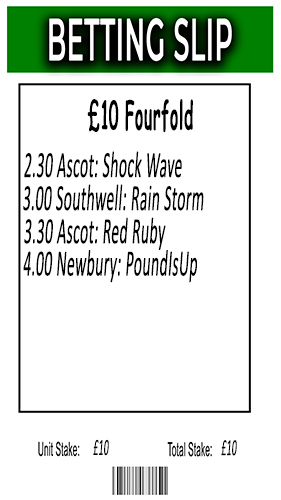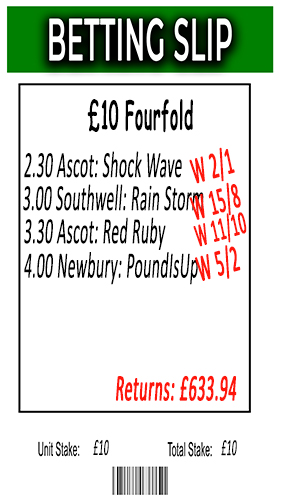The Fourfold Bet: The More, the Merrier
By Stuart Ward, 6th January 2025

You've played the double and treble. The excitement gripped you. The successes thrilled you. And, along the way, you have received a fat wad of cash from your bookmaker.
Do you now want to up the ante? If so, the next step is to consider placing a fourfold bet.
With a fourfold, the principle remains the same. And we've discussed this in previous accumulator betting articles. All selections must win for the bet to pay out. It only takes one loser to bring the whole wager crashing down.
The reality is that trying to predict the winner of four horse races is very hard. But the potential rewards, if it all comes together, can be staggering.
What does a fourfold mean?
It is one wager on four selections, competing in four separate events.
Those events could be anything. Football is popular with many pub-going punters. But for the sake of this website, we will concentrate on horse racing.
So, your win fourfold would be one wager to predict the winners of four separate horse races.
How does a fourfold each-way bet work?
When you place an each-way acca, you are actually placing two bets. The first wager is for all four horses to win. The second wager is for all four horses to place (which will depend on the race conditions).
Since there are two bets, you will double your total stake. For example, a £10 each-way fourfold would cost a total of £20.
If one or more horses lose, you lose the entire win part of the bet. If all selections place, you will receive a payout at a fraction of the odds.
How to make a fourfold bet.
Finding the winning horse in four races is not an easy task. So your understanding of form and analysis skills must be second to none.
To make a win fourfold, you have to predict the winning horse in four separate races.
On your betting slip, you will write:
![]() The time of each race.
The time of each race.
![]() The name of each meeting (i.e., Ascot).
The name of each meeting (i.e., Ascot).
![]() The names of each of your selections.
The names of each of your selections.
Your slip should look something like this:

How to work out the returns on a fourfold.
Taking our example bet above, all four horses have won, the jockeys have weighed in, and your bookmaker has settled your bet. Great!

Okay, that settled betting slip is a bit old-school. Technology does the heavy lifting for the bookmakers these days. But old-school is the betting shop world I come from, and I still like it. Melancholy!
Either way, the principle is still the same.
The bookmaker settled that bet by multiplying all four selections' odds by the unit stake.
2/1 (3) x 15/8 (2.875) x 11/10 (2.1) x 5/2 (3.5) x £10 stake = £633.94 returned.
What about non-runners?
As frustrating as it is to have non-runners in your accumulator bets, it does happen. The question is, how do void selections affect your fourfold?
![]() One non-runner will reduce your punt to a treble on the remaining selections.
One non-runner will reduce your punt to a treble on the remaining selections.
![]() Two non-runners will leave you with a double.
Two non-runners will leave you with a double.
![]() Three void selections and you're left with a single bet.
Three void selections and you're left with a single bet.
![]() If all selections are void, you'll get your stake money back.
If all selections are void, you'll get your stake money back.
Summary
The more horses you include in your accumulator bets, the more likely you are to lose. Believe me, after twenty years of working in the game, I know the bookmakers love punters who place accas.
But, with each winning selection in a fourfold, the potential returns rise significantly. It's this that makes accumulator betting both nerve-wracking and thrilling.
There are alternative wagers that have four selections. And these bet types could claw back some of your stake money should you experience one or two losers. The Yankee and Lucky 15 are examples of multiple and full-cover betting opportunities.




